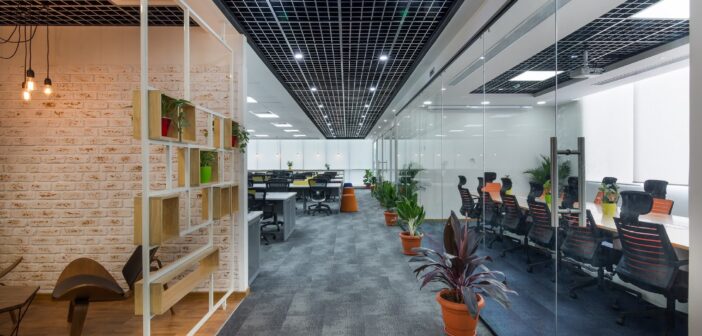Delhi-NCR, Chennai and Bangalore dominated flexible space absorption by operator in Jan-Mar 2024.
CBRE India Office Figures Q1 2024 points that while the technology sector led quarterly absorption, the flexible office space segment emerged as the second-largest sector during the quarter. Total office leasing by flexible space operators stood at 3.0mn. sq. ft. during Jan- Mar ‘24, marking a surge in activity with a 22% share in overall office leasing across 9 cities. Top cities including Delhi-NCR, Chennai, and Bangalore dominated flexible space absorption by operators in Jan -Mar’24.
According to the report, flexible space operators have emerged as a prominent force within the Indian office leasing ecosystem consistently securing a share exceeding 15% in the past five years. This trend reflects an upward trajectory in the space leased by such operators and is anticipated to continue its growth.
India is the fastest-growing flexible office market in the world. The sector is likely to gain further traction driven by increasing demand across diverse segments, including large enterprises, the burgeoning start-up ecosystem, and GCCs establishing their R&D operations in India. As hybrid work models become increasingly popular, the anticipated strong demand for flexible spaces would propel the sector’s impressive growth trajectory for the foreseeable future.
As per the report, the office sector in India witnessed a gross absorption of14.4mn. sq. ft. during Jan-Mar ’24 across the 9 cities, a marginal decline of 3% (Y-o-Y). Development completions of about 9.8 mn. sq. ft. was recorded in Jan-Mar‘24, declining by 10% (Y-o-Y). The non-SEZ segment dominated development completions with a share of 90%, compared to 88% during the same period in the previous year.
Further, Bangalore led the office leasing activity, followed by Delhi NCR and Hyderabad. Together, the three cities together accounted for 65% of the total leasing activity. Nearly half of the leasing during the quarter was led by expansionary initiatives by corporates across the top cities.
Jan-Mar’24period saw technology companies leading with highest share in leasing activity at 26%,followed by flexible space operators at 22%. Engineering and manufacturing (E&M), and banking, financial services, and insurance (BFSI) firms were the other prominent drivers accounting for 13% and 12%, respectively.
Similar to the last quarter, domestic firms dominated quarterly leasing with a share of 48% in Jan-March ‘24, primarily led by flexible space operators, technology firms and BFSI corporates. Further, in technology sector, the space take up was led by software & services with 95% share. The cumulative share of technology companies and flexible space operators increased to 48% during the review quarter compared to 32% in the preceding quarter.
Global Capability Centres (GCCs) accounted for a share of one-third in the overall India office leasing in Jan- Mar ’24. Within the GCCs space take-up, E&M companies contributed to over one-fourth share, followed by automobile firms. Bangalore led the chart for GCC leasing, boasting a 60% share, followed by Hyderabad with 26% and Delhi-NCR with 9%. Notably, 38% of the large-sized deals (exceeding 100,000 sq. ft.) were secured by GCCs during this period, underscoring their significant impact on the office leasing landscape.
Office space take-up was dominated by small- (less than 10,000 sq. ft.) to medium-sized (10,000 – 50,000 sq. ft.) transactions in Q1 2024 with a share of 81%. The share of large-sized deals (greater than 100,000 sq. ft.) in Q1 2024 increased to 8% from 5% during the same period in the previous year. Bangalore and Hyderabad dominated large-sized deal closures in Q1’24, followed by Delhi-NCR and Chennai, while a few such deals were also reported in Kochi, Mumbai, and Pune.
Anshuman Magazine, Chairman & CEO – India, South-East Asia, Middle East & Africa, CBRE, said,“The office sector continued witnessing meaningful gains in 2023, enhanced by a resurgence in occupiers’ sentiments and pent-up demand post a rise in return-to-offices. During 2024, occupiers would prioritise high-quality office space as they continue to facilitate portfolio expansion and consolidation. India’s inherent advantages, such as its skilled workforce and well-established business ecosystem, continue to hold appeal, leading to a positive outlook for the office sector.”
Ram Chandnani, Managing Director, Advisory & Transactions Services, CBRE India, said,“Economic growth and strategic policies are fuelling a dynamic transformation in India’s office market, attracting a wider range of industries. While the technology sector continues to be the mainstay, the broader demand base is reflected in leasing trends, with sectors such as BFSI and E&M exhibiting higher levels of activity. At a city level, the office activity would be concentrated in major cities such as Bangalore, Mumbai, Hyderabad, and Delhi-NCR. However, higher confidence and availability of talent are expected to propel cities such as Chennai and Pune to witness an upsurge in both leasing activity and development completions, building on from 2023. Global firms are expected to expand their presence by setting up or expanding existing GCCs. Similarly, domestic firms would expand and solidify their presence, strengthened by a period of financial buoyancy and a well-capitalised financial system.”
GCCs to continue being a prime demand driver
India is poised to remain a prominent market for GCCs, aided by the size of engineering workforce available in the country, competitive costs, and an established ecosystem.
Existing corporates, buoyed by the success of their current facilities, are actively pursuing operational expansion. Global occupiers from sectors such as BFSI, technology, and E&M would continue expanding their GCC services in India, potentially even venturing into multi-functional centres in 2024.
Established GCC occupiers with a long-term vision may explore the development of large-scale campuses in India’s top cities.
Newer entrants are more likely to gravitate towards flexible workspace solutions, offering the advantage of calibrating their operations as required.
The number of GCCs is expected to increase by 20% by 2025. The office sector is poised to witness an influx of small to mid-sized enterprises seeking to upgrade their digital and deep technology capabilities, such as artificial intelligence and machine learning.
Robust pipeline of high-quality, investment-grade supply to continue
The supply influx is anticipated to remain strong, with a significant portion of investment-grade office space expected to enter the market in 2024.
Bangalore, Hyderabad, and Delhi-NCR are likely to dominate new completions, followed by Chennai, Pune, Mumbai, and Kolkata. Developers are exhibiting a growing emphasis on building state-of-the-art facilities with amenities catering to the evolving requirements of modern businesses.
Factors such as convenient access to public transportation systems, a healthy mix of outdoor green spaces, optimum air quality and F&B options are poised to become increasingly prominent features within newly completed developments.
Going forward, the year is expected to witness a higher proportion of large-sized assets to meet the growing demand, signifying a rise in the popularity of integrated or mixed-use developments.
Select micro markets across the country are also likely to experience moderate rental growth led by the infusion of new quality supply or limited availability of contiguous spaces.
Employee experience on top of occupiers’ agenda
As office occupancies improve and the workplace evolves into a hub for collaboration, firms are investing heavily in creating bespoke and engaging experiences.
This trend is likely to see occupiers invest in developing ‘experiential workplaces’ that promote brainstorming, enhance employee productivity, and prioritise well-being. This approach entails the creation of high-quality assets equipped with desirable amenities, fostering a vibrant and engaging work atmosphere.
Sustainable features emerging as ‘must-haves’ in office buildings
Top office developers are increasingly focusing on constructing green-certified office spaces as the dialogue on sustainability takes centre stage in the real estate sector.
This trend is expected to continue in the coming years, with an anticipated rise in the proportion of sustainable buildings. Furthermore, occupiers are likely to extend their focus beyond mere green certifications.
Expected to explore a broader range of considerations, including regular measurement of environmental metrics, benchmarking of emissions, and initiatives that enhance the overall social well-being of their employees.
Track2Realty is an independent media group managed by a consortium of journalists. Starting as the first e-newspaper in the Indian real estate sector in 2011, the group has today evolved as a think-tank on the sector with specialized research reports and rating & ranking. We are editorially independent and free from commercial bias and/or influenced by investors or shareholders. Our editorial team has no clash of interest in practicing high quality journalism that is free, frank & fearless.
Subscribe our YouTube Channel @ https://bit.ly/2tDugGl





